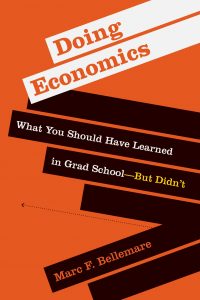In Doing Economics: What You Should Have Learned in Grad School – But Didn’t, Marc F. Bellemare offers a new guide to research economists to help equip them with the practical tools for ‘doing economics’. This book will be an excellent starting point for young students of economics who are thinking of pursuing a career in academia, writes Ritwika Patgiri.
Doing Economics: What You Should Have Learned in Grad School – But Didn’t. Marc F. Bellemare. MIT Press. 2022.
 Find this book (affiliate link):
Find this book (affiliate link):![]()
In a world hit by COVID-19, precarity has become the norm of the job market. More and more people in academia have started talking about precariousness within the sector. With the continuous pressure to present and publish research papers, win research grants and awards and contribute to academic public goods like peer review, the minimum qualifications required for a non-tenure track job have become milestones in themselves. However, nobody really tells a grad student about what working in academia actually comprises. As I am approaching the final year of my own PhD, the importance of being able to write well as a researcher has never been felt more.
Marc F. Bellemare’s Doing Economics: What You Should Have Learned in Grad School – But Didn’t is an excellent starting point for anyone looking to pursue research, those who have started research but are feeling lost or anyone who has been doing research for some years but needs motivation. The book is especially important for young students of economics who are thinking of pursuing a career in academia but have nobody to tell them about the harsh realities of the profession.
As economics and many adjacent social science disciplines have become more empirical in nature, there are very few guides to tell researchers how to narrate their findings in words. Bellemare writes that it is almost as if there is a ‘substantial hidden curriculum’ when it comes to doing economics (2). This can be extended to academia as a whole. Research has found that along with your publication record and the prestige of your graduate programme, academic networks have an overriding influence on the selection of faculty members (Val Burris 2004; Michael Hadani et al 2012).

Image Credit: Photo by Mick Haupt on Unsplash
Like most other professions, academia has its own set of rules: it almost seems like everybody knows them yet nobody really tells them. With the presence of extensive networks and imperfect information, the process of working in academia becomes layered and unequal, and this is particularly the case for people of marginalised caste, class, gender, ethnicity, region and religion. How do you write a good paper? What does it take for your research to be published in a good journal? What should a response letter to peer review look like? How do you present your research? How do you approach funders or get grants? And, finally, how do you make sure your paper is read by the audience that you want?
Doing Economics is divided into eight chapters, each telling researchers and economists how to handle the various steps that one needs to take to be successful in academia, which researchers are otherwise ‘expected to learn on their own’ (39).
The second chapter, ‘Writing Papers’, makes it clear to the reader that every opportunity to write is an opportunity to practise writing well. Bellemare introduces the concept of ‘inspectional reading’. Most of the time graduate students apply this idea to get a summary of the papers needed to complete the required syllabus. Inspectional reading involves reading the introduction, the methodology, the results and the conclusion. Bellemare warns that while inspectional reading is a good way to develop one’s knowledge of the literature, it is no way to write good papers (6).
Bellemare adds in a footnote that the greatest sin an academic writer can commit is the sin of omission, followed by the sin of commission. Leaving important information out of a paper and forcing the reader to rifle through the piece hunting for a specific bit of information are both dangerous writing habits. This chapter lays out the standard structure of a good economics paper, outlining what works and what does not.
The third chapter, ‘Giving Talks’, provides the reader with an idea of the various kinds of talks an academic department can invite you to give. Bellemare focuses on the importance of precisely understanding the norms of the department in which you are presenting your work, including the time allotted and the ground rules for questions asked by the audience. My colleagues from other departments have always talked about keeping the audience focused with good slides that have less text, just including pointers on what you will be discussing. This ‘less is more’ strategy does not always hold in economics, and Bellemare reiterates what I often tell my colleagues in response: that ‘economists tend to be more comfortable with more text on slides as well as with fewer images’ (40). This helps in making the audience understand what is done in the paper and the author spends less time memorising the content! Bellemare emphasises that a talk should be structured just like a paper and that it is important to keep in mind who the audience will be.
The fourth chapter, ‘Navigating Peer Review’, is my favourite chapter from the book. As an early career researcher, publishing is the real quest – the route to all other aspirations. Bellemare makes this clear by emphasising how in economics, articles in peer-reviewed journals are the ‘coin of the realm’ rather than books or chapters in edited volumes (61). The peer review process may not be a perfect system as it can take a long time – reviewers may not have read one’s work properly and editors might not read the reviews closely either. But Bellemare argues that it is the best system available compared to the alternatives and it leads to better scholarship. Peer review as a form of ‘gatekeeping’ is indeed a necessity (62).
Chapter Four then tries to help the reader understand when you are ready to submit your work. Bellemare gives a solution to this – ‘Your paper is ready to be submitted for publication when you keep hearing the same comments about it when presenting, or in conversations with colleagues about it, and those comments are about things you cannot do anything about except acknowledge them in the paper’ (63). The chapter also gives readers an idea about the seasons when researchers should apply and how to decide where to submit. Bellemare includes some great journal submission strategies: for example, when submitting to a field journal, he advises citing articles in that journal and its competitors published in the last five years. This suggests to the editors that your article belongs in that journal and further helps them in finding reviewers.
The fifth chapter ‘Finding Funds’, the sixth chapter ‘Doing Service’ and the seventh chapter ‘Advising Students’ all give another view of what academic life entails, if one is not already familiar with this. It is true that success in academia means different things to different people. There are many pathways to achievement in academia and the book gives readers an understanding of what these various paths could be and how to navigate them.
Doing Economics has been heralded by many on social media as the book that should have been published when they were in grad school. Life in academia is hard in itself; the imperfect information given to young and aspiring entrants to the profession further complicates matters. Doing Economics is an introductory gateway to a world which is highly gated and uncertain.
Note: This review gives the views of the author, and not the position of the LSE Review of Books blog, or of the London School of Economics and Political Science. The LSE RB blog may receive a small commission if you choose to make a purchase through the above Amazon affiliate link. This is entirely independent of the coverage of the book on LSE Review of Books.







